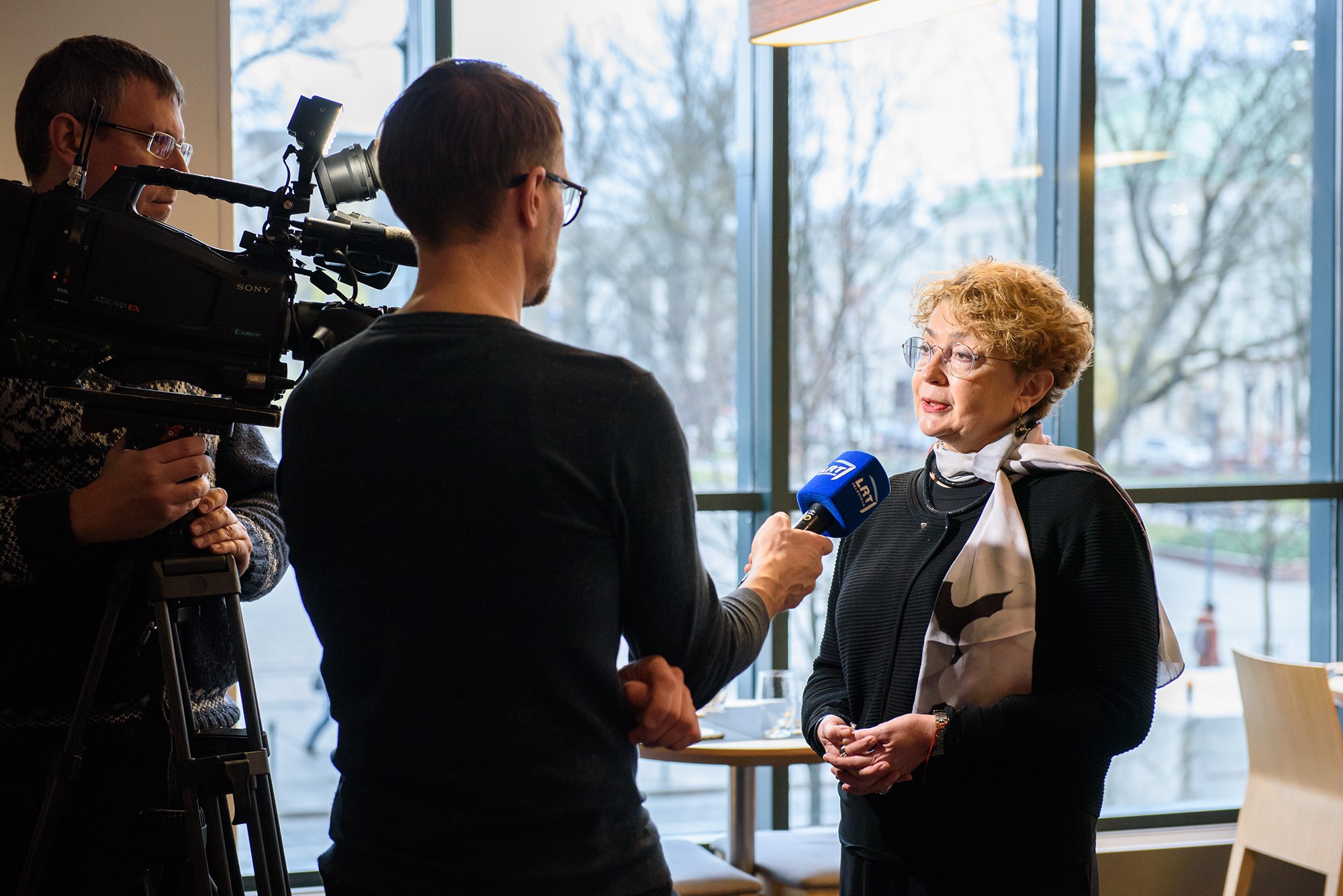
Anti-Semitism Will Remain, But It’s Not Always a Threat, US Professor Says
by Rūta Kupetytė, LRT radio program Ryto garsai, www.lrt.lt
Just as anti-Semitism, xenophobia and Romophobia have long existed in the subconscious, so they will remain, but don’t pose an extreme threat. So said US professor of history Saulius Sužiedėlis in an interview aired on Lithuanian national radio.
He said history has shown these kinds of sentiments only became dangerous in certain situations, but in others a nationalist attitude can even be a healthy thing.
Professor Sužiedėlis was in Vilnius to give a presentation at the international conference “Remembrance, Responsibility, Future.”
Several years ago you said there is almost no such Holocaust denial in Lithuania as it exists in the West, because everyone knows the Jews were murdered here, but that there are certain problems of suppression and diminishing of significance, and attempts to down-play Lithuanian involvement in the process. You said that seven years ago. Has the situation now changed?
Sužiedėlis: Let’s remember one thing: there was no greater mass murder in Lithuania than the genocide of Jews in 1941. These are the very worst mass murders in Lithuanian history.
Full interview in Lithuanian here.
International Conference Remembrance, Responsibility, Future Held in Vilnius
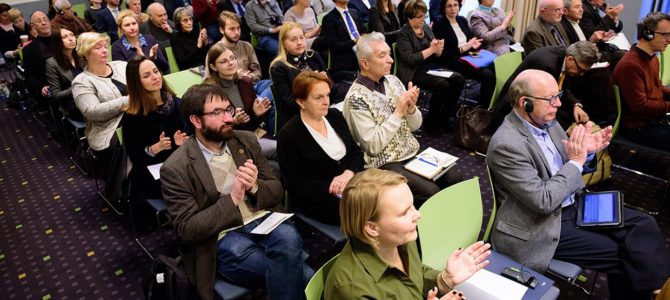
To mark the international day against fascism and anti-Semitism, the Lithuanian Jewish Community held a large international conference November 9 called “Remembrance, Responsibility, Future” which attracted well-known scholars and media attention. Speakers discussed whether commemoration of painful historical events can serve as a bridge to understanding contemporary politics and prevent such events in the future.
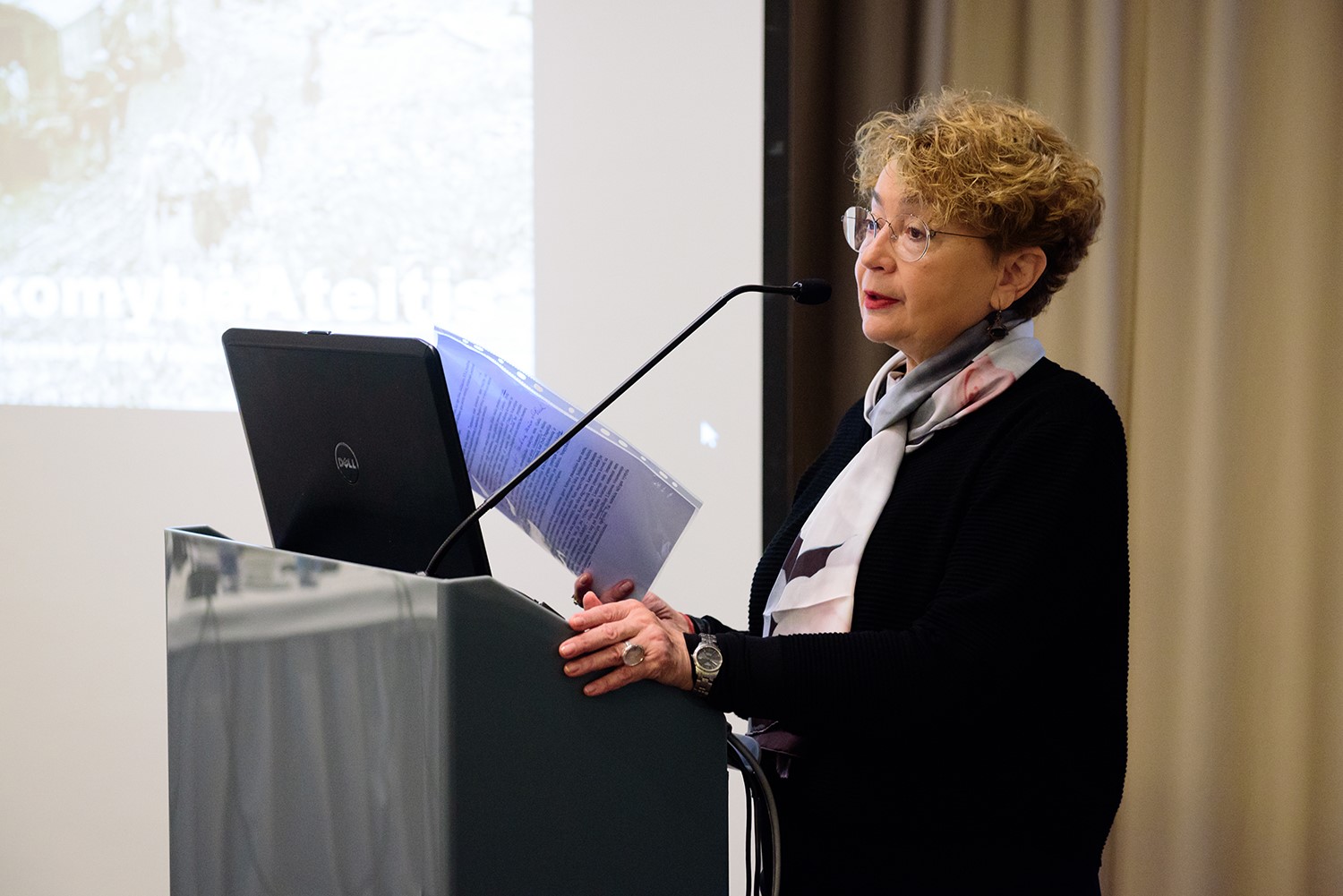
LJC chairwoman Faina Kukliansky, US ambassador Anne Hall, German ambassador Angelika Viets and deputy chief of mission for the Israeli embassy Efrat Hochtetler welcomed conference participants.
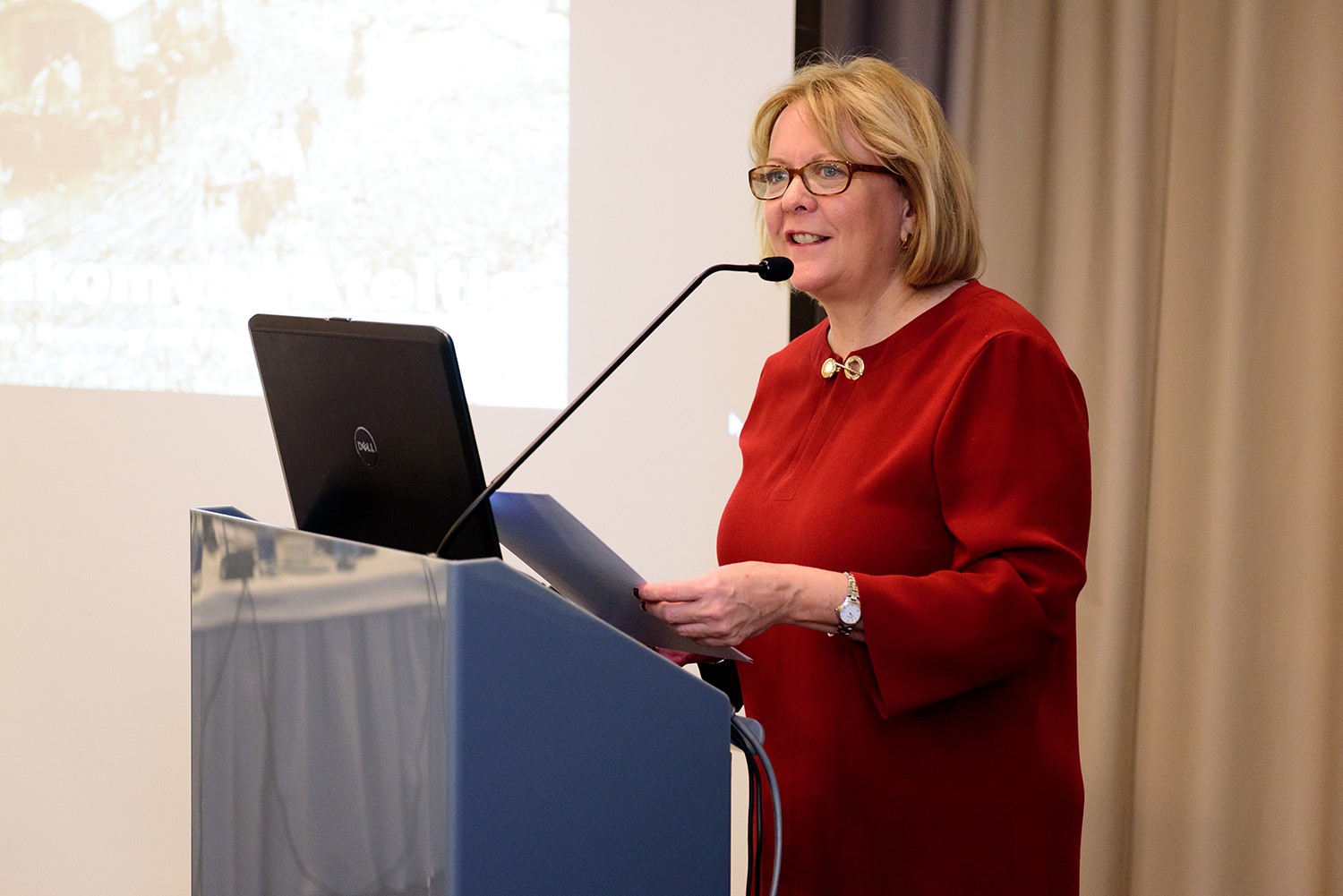
Unique Jewish Archive Emerges in Vilnius
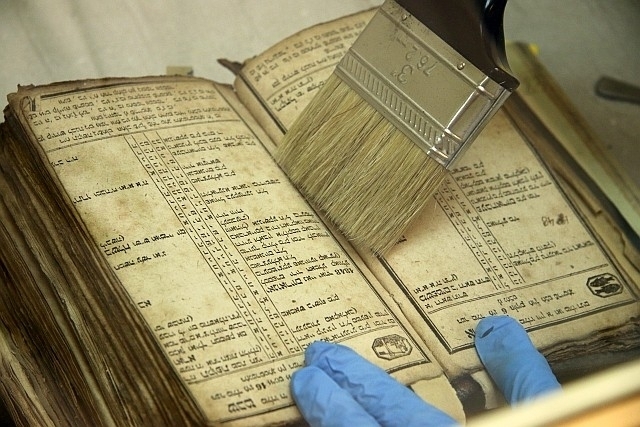
Vilnius, November 3, BNS–As Judaica studies intensify in Vilnius, scholars have identified thousands of important Jewish manuscripts this year which had laid forgotten in a church basement during the Soviet years and were scattered to separate archives for two decades following Lithuanian independence.
Some of the newly identified documents are currently on display in New York City and there are plans to exhibit some of the collection in Lithuania in the near future as well.
Lithuanian National Martynas Mažvydas Library director Renaldas Gudauskas said the identification of ever more documents makes him confident the library currently conserves one of the most significant collections of Judaica in the world.
Hidden at a Church
Vilnius had hundreds of Jewish communal, religious, cultural and education organizations before World War II. YIVO, the Jewish research institute founded in 1925, was an important member of that group. YIVO did work on Jewish life throughout Eastern Europe, from Germany to Russia and from the Baltic to the Balkans, collecting Jewish folklore, memoirs, books, publications and local Jewish community documents, and published dictionaries, brochures and monographs.
Conference on Anti-Semitism and Romophobia in Lithuania
Press release
Marking November 9, the international day against fascism and anti-Semitism, the Lithuanian Jewish Community is holding an international conference called “Remembrance Responsibility Future” for notable scholars and specialists to seek solutions to pressing problems, including whether the commemoration of painful historical events can serve to educate in contemporary policy and help to insure the Holocaust never happens again.
The main goal of the conference is to come up with effective recommendations for fighting anti-Semitism and Romophobia in Lithuania. The conference is intended to demonstrate the intersection of historical memory and contemporary forms of hate in Lithuania. It is part of a project called “Drafting and Publication of Recommendations for Fighting Anti-Semitism and Romophobia in Lithuania” with support from the EVZ foundation in Germany. This foundation supports systematic and long-term studies of discrimination against and marginalization of Roma and Jews in Europe. The Goodwill Foundation is also supporting the Lithuanian project.
Professor Saulius Sužiedėlis is to deliver the main presentation November 9 called “Warning of History: Origins and Development of Anti-Semitism in Lithuania.”
Šarūnas Liekis, Vygantas Vareikis, Linas Venclauskas, Violeta Davoliūtė and Charles Perrin are also scheduled to give presentations.
The agenda includes a discussion of contemporary anti-Semitism.
Partners include the Roma Social Center, the Lithuanian Human Rights Center and the Women’s Information Center.
The conference begins 9:30 A.M., November 9, in the conference center of the Novotel Hotel at Gedimino prospect no. 16, Vilnius.
New Calls for Jewish Restitution

by Vytautas Bruveris, www.lrytas.lt
After adopting a law on compensating Jewish religious communities, Lithuania should go further and compensate Holocaust survivors for their private property. Both US officials and the Lithuanian Jewish Community are calling for this.
The Lithuanian prime minister’s advisor on foreign policy Deividas Matulionis said: “The issue of returning Jewish private property was raised earlier, but it’s being discussed more frequently now. I wouldn’t say there’s pressure, but the Americans have let us know return of Jewish property remains on the agenda.”
Matulionis was government chancellor in the earlier Government led by Andrius Kubilius when the law creating the Goodwill Foundation was adopted. Under that law the state pays out compensation for Jewish religious community property lost during the war, financing Jewish cultural, religious, educational and other socially useful activities.
The Lithuanian Government is obligated to pay 37 million euros in total to the foundation.
US Diplomat Visits
Matulionis recently spoke with Thomas Yazdgerdi, the US State Department’s special envoy for Holocaust issues, in Vilnius.
The American diplomat also met MPs and leaders of the Lithuanian Jewish Community.
One of the Yazdgerdi’s main topics of discussion was the continuing return of Jewish property.
He said Lithuania following the examples of other Central and Eastern European countries should keep moving forward by returning private property to Holocaust survivors and their descendants or by paying out compensation.
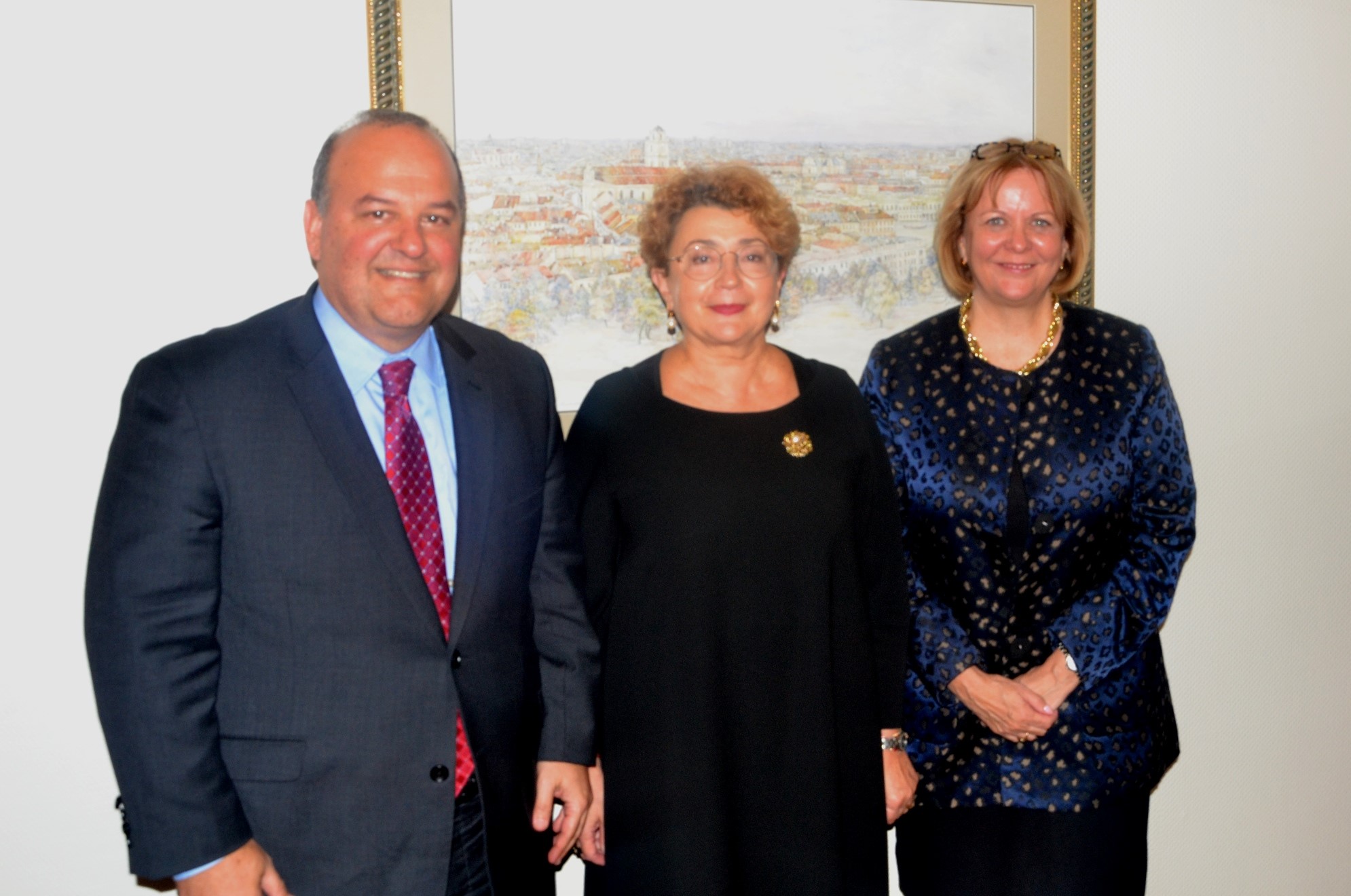
US Officials Urge Lithuania to Return Jewish Property
Vilnius, November 8, BNS–US officials and the Lithuanian Jewish Community are calling upon the Lithuanian Government to return private property to Holocaust survivors and their descendants, the daily Lietuvos Rytas reported Wednesday.
“The issue of restitution of private Jewish property has been raised in the past, but it is being increasingly discussed lately,” Deividas Matulionis, foreign policy adviser to prime minister Saulius Skvernelis, told the paper.
Matulionis recently discussed the issue with US State Department special envoy for Holocaust issues Thomas Yazdgerdi in Vilnius. The Lithuanian prime minister’s advisor told Lietuvos Rytas they hadn’t discussed any specific measures for restitution or numbers.
Matulionis said they talked about possibly compensating Jews for a portion of the value of their property and said that would be more of a symbolic gesture.
Six years ago Lithuania committed to paying 37 million euros compensation for Jewish religious communal property by 2023.
![]()
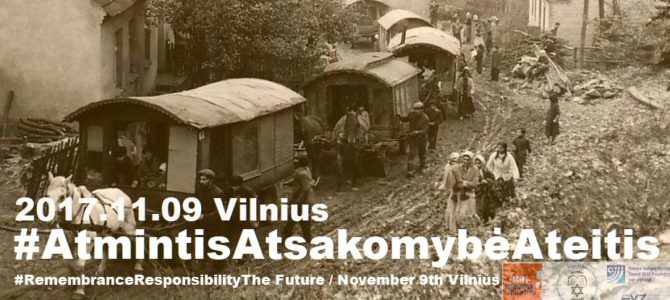
Invitation to International Conference #RememberanceResponsibilityFuture

Introduction
Dovilė Budrytė, Ph.D., Professor of Political Science ![]()
Georgia Gwinnett College, Georgia, USA
Writing about memory in Eastern Europe, Alexander Etkind observed in his book Warped Mourning that various groups are likely to cultivate different versions of the past, define their friends and foes, thus creating separate memory communities that are likely to engage in memory wars. Etkind’s observation raises several fundamental questions about historical memory in Eastern Europe: Can a major historical trauma start uniting various groups to combat current expressions of prejudice and violence? How should major historical traumas be commemorated so that memory wars are avoided? Are there proper ways to remember horrendous events to make sure that history does not repeat itself?
Public Relations Horoscope

by Sergejus Kanovičius
The weighing ritual from the Soviet era has impressed itself deeply in memory: a plump woman standing behind the counter in a store with a white apron, the apron is somewhat wrinkled and with grease stains, the scales have larger and smaller weights, and she stands and watches, if she has something to way. One weight, and another, then another is needed to reach complete balance, placed on the right-hand plate of the scales, always a deficit, whose weight is measured by this very important woman. The woman is all-powerful. Usually she set some fifty or more grams aside, she also had to supplement her salary. Why do I remember this? I see how today the PR masters and the politicians who have taken up their ideas are joyfully weighing and trying to place a weight or two on a much emptier plate of the scales of historical truth. But one gets the impression that they, just as the woman in the Soviet store did, are setting a bit aside. Sometimes more, sometimes less. Usually more, unfortunately.
You leave their store and unwrap the purchase and hey, either it’s just paper, or else they’ve taken a bit for themselves again. And then you wait again until they decide the time has come to mete out some sort of historical deficit.
As I understand it, the quota for naming the year of the coming 100th anniversary of the state has been used up. Other years are being suggested, maybe the year of the bear on the Chinese calendar, or perhaps the year of the dragon or the cat on the Japanese, one year under the Jewish calendar and a different one according to Christ. Well anyway, we like to baptize, to be baptized and to attend baptisms, it’s fun. Even if there is no baby, we’ll make one up.
Rūta Vanagaitė’s Stories Cause Ears to Perk Up Abroad
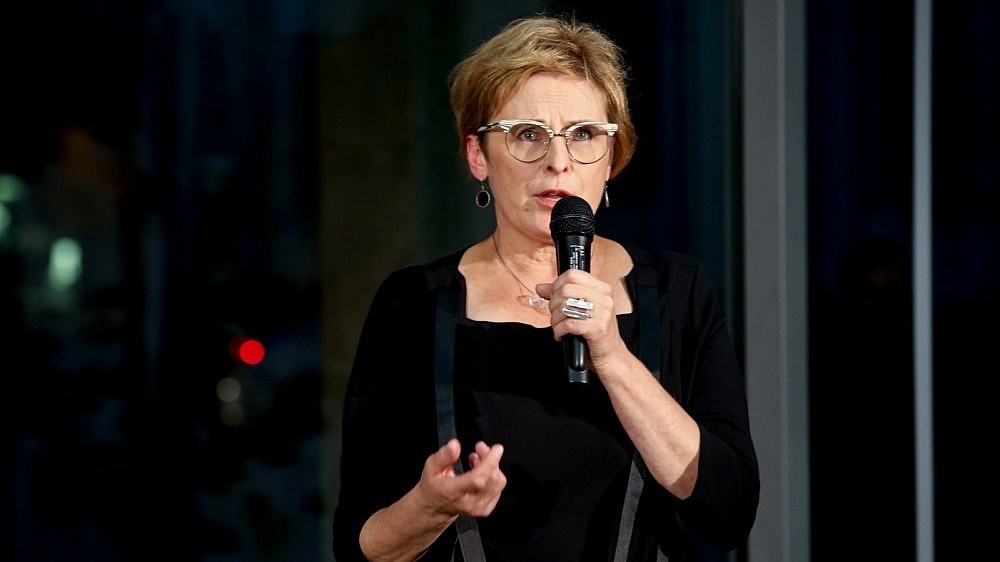
Photo: BNS
by Joana Lapėnienė, LRT teleivison program Savaitė, www.LRT.lt
Rūta Vanagaitė accuses Adolfas Ramanauskas while her defenders accuse Lithuania.
The voice of the European Jewish Congress resounds the loudest in this matter, whose leader is an oligarch sympathetic to the Kremlin, the Russian businessman who likes to show off photos of himself with Vladimir Putin and who often praises the latter, but the fact remains the case has resonated beyond Lithuania’s borders. And deliberations on whether the rights of people who hold an alternative view are abused in Lithuania, whether books are burned in Lithuania because of the point of view they express, books about the Holocaust among them, and whether we are trying again to avoid responsibility in the mass murder of Jews, are not beneficial to Lithuania.
Was this scenario planned? It turns out the chairwoman of the Lithuanian Jewish Community attempted to talk the head of the European Jewish Congress, Putin’s beloved oligarch, out of making these accusations against Lithuania. When we tried to find out what the Lithuanian Foreign Ministry and its special ambassador for contacts with Jewish organizations had done, we only received a general sort of letter saying they are constantly working. People we interviewed, however, said the opposite. But replies must have been drafted, because Vanagaitė’s letter purely for local consumption was a public one. She has not taken back any of what she said outside of Lithuania and has not recognized any wrong-doing. She did, however, thank an embassy for supporting her in telling her truth, meaning the Lithuanian Foreign Ministry.
Lithuanian Jewish Community Position on Public Discussion of Writer Rūta Vanagaitė’s Statements Regarding Lithuanian Partisan Leader Ramanauskas “Vanagas”
The Lithuanian Jewish Community, or LJC, expresses concern over public discussion of writer Rūta Vanagaitė’s statements regarding the actions of Lithuanian partisan movement leader Adolfas Ramanauskas “Vanagas.” At this time the LJC knows of no reliable information based on extant historical documents confirming the accusations made against Ramanauskas implicating him in the Holocaust or the murder of Jews of Lithuania.
We call upon all sides to refrain from making rash statements leading to public discord and emphasize that discussion of complex questions of Lithuanian-Jewish history should be based on the principles of mutual respect, openness and honesty.
The LJC respects the right of the private publisher Alma Littera to carry out its own business plan as it sees fit. Nonetheless, the LJC considers the publishing house’s decision on how to utilize the works of Vanagaitė, recalling from stores all of her works, inappropriate, and that it could lead to conflict within society.
Adhering to the belief that historical justice and its restoration should be based on reasoned studies by professional historians using authentic documents, the LJC invites the public, professional historians and national leaders to take measures to halt the further division of society and the spread of hate.
PM Says Lithuania Doesn’t Need to Review Position on Holocaust Collaboration
Vilnius, November 2, BNS–Lithuanian prime minister Saulius Skvernelis says Lithuania doesn’t need to review its position on the role played by Lithuanians in the Holocaust.
“There’s nothing for us to review, as a state we have performed all actions and further have excellent dialogue with the Lithuanian Jewish Community and the world Jewish community. We aren’t saying that the painful issues which exist shouldn’t be discussed, and those discussions are taking place within the Government, their representatives and community representatives are visiting. So there’s nothing really to reconsider,” the head of the Government said on the Žinių radijas radio station Thursday.
He was commenting on the call by the European Jewish Congress for Lithuania to review fundamentally the role of Lithuanians during the Nazi occupation and to stop honoring those who collaborated with the Nazis and actively took part in the mass murder of Jews in Lithuania.
“If someone wants to reconsider something or go deeper, this is the work of historians, and historians must base their findings on very clear, systematic historical information and facts, not on the interpretation of facts, but on the totality of facts. Then one can discuss and speak,” the Lithuanian prime minister said. He also said Lithuania as a state has done everything to insure good relations between the state and the Jewish community.
Lithuanian Foreign Ministry Says Not to Set Jewish Genocide against Anti-Soviet Resistance
Vilnius, November 1, BNS–Lithuanian diplomats say the genocide of Jews and the Lithuanian armed struggle against the Soviet occupation shouldn’t be set against each other.
The Lithuanian Foreign Ministry Wednesday expressed regret over a statement from the European Jewish Congress condemning the Lithuanian publisher Alma Littera’s decision to halt sales of books by Rūta Vanagaitė and criticism of the Lithuanian public relations specialist and author for allegedly libeling partisan leader Adolfas Ramanauskas “Vanagas.”
“For many years now Lithuania has been working in Holocaust research and education in consultation with international Jewish organizations including the World Jewish Congress and the European Jewish Congress. Counterposing the Jewish genocide against the Lithuanian anti-Soviet resistance in this context is completely unacceptable,” a press release from the Foreign Ministry stated.
Columbia U Honors Maverick Litvak Pharma King

First Plaque Commemorating Rescuers in Lithuania
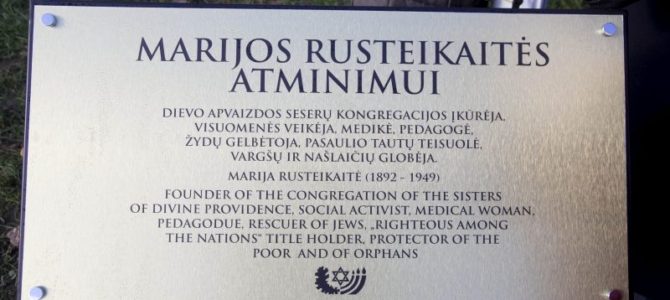
Panevėžys Is the First to Thank Jewish Rescuers
www.sekundė.lt
The first plaque commemorating those who rescued Jews during the Holocaust has been unveiled in Panevėžys, Lithuania. It honors nun, activist, nurse and teacher Marija Rusteikaitė of the Congregation of the Sisters of the Love of God and her fellow nuns. The stone plaque was unveiled at a ceremony at the intersection of J. Tilvyčio and Krekenavos streets in the Lithuanian city, close to where the Sisters of the Love of God monastery and hospital were located, according to historical documents.
“It was namely this spot, a few dozen meters away, which is the most important historical site of the monastery for us, because this is where Marija Rusteikaitė brought together the nuns, the first sisters of the Love of God, between 1925 and 1936. As soon as she completed the university of medicine in St. Petersburg, the mother superior from Žemaitija joined the St. Vincent de Paul society in order to help the poor people of the city of Panevėžys and surrounding areas. Before that she taught mathematics and geography at the Kražiai pre-gymnasium and Polish at another location,” sister Leonora Kasiulytė, who has long taken an interest in the historical figure, said of the founder of her monastery.
US State Department Holocaust Envoy Visits LJC
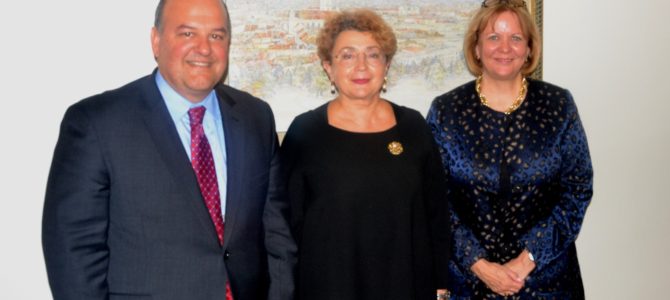
Special envoy for Holocaust issues in the European and Eurasian Bureau of the United States Department of State Thomas Yazdgerdi has visited the Lithuanian Jewish Community and met with chairwoman Faina Kukliansky.
They discussed progress and problems in Holocaust commemoration and the goals the LJC has set for itself and the Lithuanian state in entering a new stage of commemorating Holocaust victims, education and restitution.
The special envoy also heard about work the LJC is doing in human rights in general, including actively participating in a coalition of human rights organizations and a project for drafting and publishing recommendations at the Lithuanian and European level for fighting anti-Semitism and Romophobia.
Righteous Gentile Marija Rusteikaitė to Be Commemorated in Panevėžys
Dear members,
A ceremony to unveil a stele honoring Marija Rusteikaitė, rescuer of Jews, teacher, nurse, public figure and founder of the Congregation of the Sisters of the Love of God, will be held at 1:00 P.M. on Friday, October 27.
The ceremony will be held at the intersection of Tilvyčio and Krekenavos streets in Panevėžys. Bus transportation from Vilnius will be provided from the Lithuanian Jewish Community at Pylimo street no. 4 in Vilnius at 10:45 A.M. There are ten seats left at the time of this writing. Those wishing to take the bus should send an email to info@lzb.lt
Those riding by bus will be delivered back in Vilnius in time for the special Sabbath at the Choral Synagogue in Vilnius.
LJC Calendar for 5777 Wins Prize at Unusual Ceremony
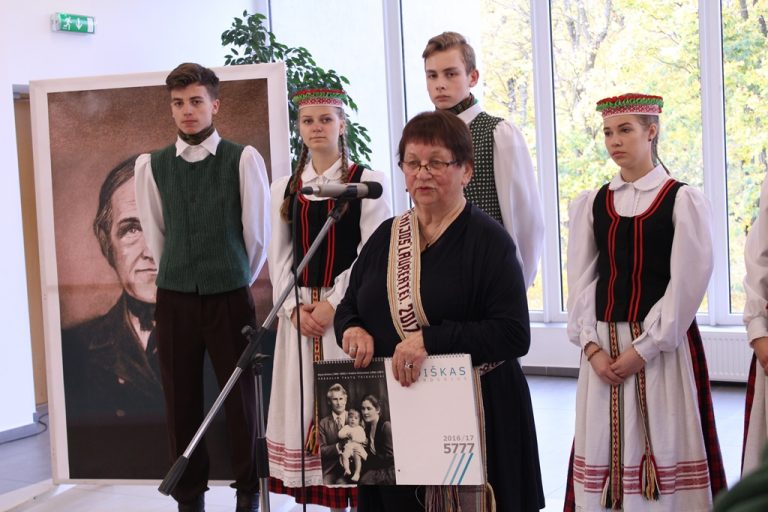
A Jewish calendar published by the Lithuanian Jewish Community last year took first place in an annual Lithuanian calendar contest October 20.
The 28th annual Laurynas Ivinskis Prize ceremony was held in Kuršėnai, Lithuania with live Lithuanian folk music and a performance by the Fayerlakh ensemble.
The theme of the LJC calendar for 5777 was Lithuanian rescuers of Jews. It featured interwar president Kazys Grinius and wife Kristina on the cover, both Righteous Gentiles. Each month featured more than one story of rescue.
Laurynas Ivinskis (1810-1881) was a 19th century calendar maker whose agricultural calendars were also more text than calendar, and were for a period of time forbidden by Russian authorities because they were written in Lithuanian using the Latin rather than Cyrillic alphabet. His almanachs included stories and parables in pre-standard Lithuanian.
Khasia Shpanerflig Has Died
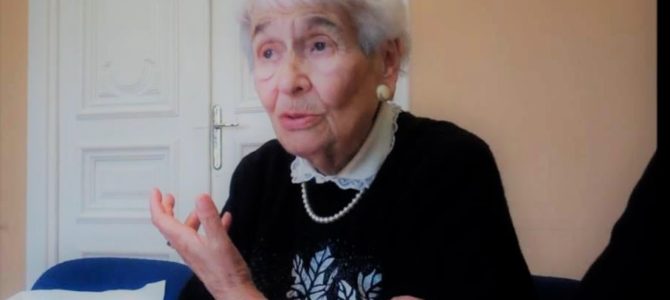
Khasia Shpanerflig (Chasia Španerflig) has died at the age of 97. She was a long-standing member of the Community and formerly a student at the Tarbut Gymnasium as well as a Jewish partisan under the Vytautas the Great Trakai brigade. As long as health permitted she devoted herself to the activities of the Union of Ghetto and Concentration Camp Prisoners, the Lithuanian Jewish Community and Holocaust education.
Our condolences to her son Volodia and daughter Sofiya and all her family and friends.
Remembering the Victims of Great Aktion in Kaunas
The Kaunas Jewish Community will pay respects to the victims of the grosse aktion at the Ninth Fort at 12 noon on October 29. The grosse aktion between October 28 and 29, 1941, was the mass murder of about 10,000 people over a single 24-hour period at the Ninth Fort.

